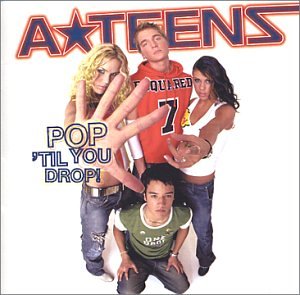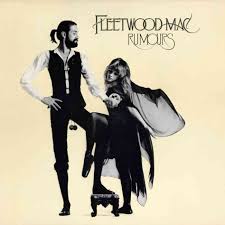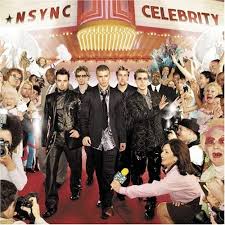I regret to announce that I have become a product of the digital age -- an age where the notion of an "album" is beginning to disappear.
A decade ago, at age 12, you would find me perusing the music shelves at Target or Sam Goody, trying to decide which disc would eventually prove itself to be worthy of my meager twelve dollars and ninety-nine cents that I had saved since Christmas. Usually the winner would be something I already knew and loved: Good Charlotte, Josh Groban, Faith Hill. Later I would invest in the latest discs from Evanescence or Breaking Benjamin. When CD-burning became a thing, I'd nab My Chemical Romance or Three Days Grace from my friends who had more money than I did to buy the actual albums themselves. I remember sitting in my room, organizing all of these lovely crystal cases by title, by artist, or by rank.

Listening to a CD for the first time was one of the most exciting experiences I had as a child. I very distinctly remember sticking in A-Teens'
Pop 'Til You Drop (2012) into my ghetto CD player at age 11. I sat down with the album cover, and listened intently to each and every track, in order, following the list of track names as if doing so were the most important thing I've ever done in my life. If there were lyrics included in the album cover, I would read along with pious devotion. If the album was awesome, my focus would not quaver in the slightest from the opening track to the final note played. If the album was lame, I'd usually get bored after track 5 or 6 and begin to listen more passively. The CD-listening experience was always an adventure.
But then iTunes came along, and suddenly I can buy albums in bits and pieces. The first song I ever bought on iTunes was "I Gotta Feeling" by the Black-Eyed Peas, off of their album
The E.N.D. in 2009. I was a freshman in high school. I have never bought the rest of the album. Since then, I've become a sucker for the 69-cent singles sales on iTunes, filling my little iPod with dozens of one-hit wonders and one-track album lists.
But, as I began writing music myself, I had an epiphany. This kind of purchasing behavior is causing the album to die.
During the "golden age" of the album (think late 70's all the way up to the mid 2000's), buying an full record was a risk. Usually you only knew one or two songs off of the whole thing; the ones you heard on the radio over and over again. You like what you've heard so far, but there is no guarantee that the rest of the album will measure up to what its singles have to offer. As I had experienced, only the best albums could keep my attention from beginning to end. Some of these albums from my childhood included The Beatles'
1, Evanescence's
Fallen, and
Middle of Nowhere by Hanson.
For a musician, creating an album -- a solid, complete album -- was an art form. Because of this risk factor, it was important to write music that satisfies the needs of the consumer as well as the musician, or else they may not ever buy your album again. In order to make a good album, you not only have to worry about individual songs, you have to consider the big picture. Consider the
story you are telling with your music. Even if there is no overarching concept to your album, there is still a change of
mood from track to track that you must consider. Do you want to begin with a bang? Do you want your audience to know exactly what they're going to hear for the rest of the album in the first couple of tracks? Or is there a dramatic change of tone that you want your audience to embrace? What are the album's high and low points? Do you want your audience to leave your album with awe? With introspect? With melancholy? Heck, you can even go further and start comparing
this album to other albums you have made in the past, and albums you may make in the future. Do you want to be known for something different than you have been doing before? The best way to state change is through the release of a fresh new album! If you take a look at how well-crafted albums like Fleetwood Mac's
Rumours or Nirvana's
Nevermind are, you get what I mean. All of the best albums in history tell some sort of story, even if it's not completely scripted within the music itself.

Furthermore, album-focused artists usually
trust their audience to maintain attention and take their work seriously from beginning to end. I feel like a stronger relationship is formed between musician and listener when there is a level of
trust embedded within the musical experience.
Not to say that great music isn't currently being created, but honestly, there's something missing. Back in the golden age of album-making, it was quality over quantity, and it was concept over commerce. That age is almost gone.
Why? Digital media now allows consumers to buy music on a song-by-song basis.
Now, when you buy music, there is little to no risk. You can pick and choose what songs you want. If all of them are pretty good, you can buy the album, but if you really are only interested in what you heard the other day on the radio, you have the option to spend a few cents on one song rather than spend several dollars on a whole album that you're really not interested in owning.
This digital trend can be really cool. I mean, I'm not the biggest fan of electronic music, but when there's one song by Zedd that I like, it's nice to know that I can put my money where it will be most useful for me
as well as useful to Zedd and anyone else who was involved in making that track. While I otherwise would have just skipped the purchase completely, I can at least support artists in a small way by buying what is valuable to me.
This also means that a lot of time, money, and effort is put into creating very well-crafted and interesting singles. I feel like there is more variety on the radio than there used to be; in order to stand out in the musical crowd, musicians and producers are adding new things (mainly technology) to individual songs that make them memorable and interesting. This digital age has also been a blessing for indie record companies, who never would have seen the light of day if it weren't for mass consumption of digital music via the internet. Songs are super catchy these days, and they are recorded with quality sound and are given lots of publicity.
There are good things that come with technology and digital media. This I know.
BUT... While singles are getting better in some regards, almost everything else on a typical modern-day album is worthless. From the sound of it, not much investment is given to tracks that aren't on the docket to become singles these days. I'm thinking of the most recent albums by Daughtry, 'Lil Wayne, and (sadly) the newest work by Sara Bareilles,
The Blessed Unrest. There are a few gems, but as album, it sucks. Even some of the more talented album creators are falling into the single trap. Take a look at the before/after shots of bands and artists like Bon Jovi, Korn, Bonnie Raitt, and Nelly. Heck, even if you look at Britney Spears's
Baby One More Time..., you can see craftsmanship and (dare I say it?)
class that you just don't see in her more recent albums. Albums are losing their place in today's musical marketplace. It's becoming less and less about the big picture, and more about the get-rich-quick approach of releasing single after stinking single.

What changed? Digital media. The minute you could start selling music on a track-by-track basis, the notion of the album completely changed. Suddenly it becomes only an afterthought. Or sometimes it became a vessel in which a brand could deliver a whole bunch of
singles at one time, even though they may all be completely unrelated and disjunctive if you put them together as a whole. I'm thinking specifically of Katy Perry's
Teenage Dream, which, while almost all of its singles were very successful, doesn't really stand up for itself as an
album.
Think of it this way: You don't usually display pieces visual art on an individual basis. Usually they appear in a gallery exhibit, surrounded by other pieces that are similar or different from it. This gives a work
context, which is one of the biggest factors in creating valuable artistic statements. There needs to be a story. The content must have a context.
This is why I think indie albums are better quality than mainstream-label records. For those who don't have the resources or publicity to keep shelling out single after single, it's all about the the impact you can give to a listener in one go with one great album. I feel like under-cover artists are usually more artistically fueled than big superstars, because money hasn't yet become a factor. When you are a band that's bone-broke and barely getting gigs, it's not like your main goal is how many millions of dollars you can make. The profit craze of big-name labels has not yet infected the fresh, creative minds of young, up-and-coming artists. When such bands or artists DO get big, they can "sell out" -- and you hear the difference.
My proposition? Reward consumers for taking the risk and buying an entire album. This responsibility lies in the musician, the listener, as well as the producers, advertisers, and marketers of popular music.
For musicians, this means continue to TRUST your audience by making quality music from beginning to end! Don't ignore the "connective tissue" of your album. Not every song has to be a single, but that doesn't mean every song that's not a single has to suck. And maybe it would be a good idea to fight the urge to make every radio-friendly tune you have a single. Save some stuff for the people who do take the time to buy your album. You don't need to be shoving singles down people's throats for them to listen to you... That is, if your music is good. If you make art, people will recognize it. This internet that we have makes it so easy to publicize and gain rapport.
And listeners? Don't waste your time with poor music! Do your homework. We have preview options now. You can know a whole album before you ever buy it using tools like Spotify and album reviews online.Don't become complacent! Find out if an album is great. If the album is not great, don't buy it! Sure, buy the singles if you want, but don't waste your money on something not worth listening to. If an album IS worth your money, BUY IT. Don't download it for free. Don't just get the singles. BUY THE ALBUM. Support the sale of the complete work! Give artists an incentive to keep creating good music. You can talk about the brainwashing influence of the music industry all you want, but honestly it comes down to what YOU as a consumer think is good art. This is a great power!

And marketers? You can make it easier on consumers as well. Think about successful franchises like Sam's Club, where both consumer and producer get rewarded by operating on a bulk system. Let's take a random CD available on iTunes: N*Sync's
Celebrity, which was released in 2001.
Currently, the CD is $9.99. If you were to buy every track individually, you would have to pay $13.77. So yeah, you do save money buy buying the whole album at once. But of course no one would buy every track separately when they can buy the whole album at once for a lesser price. Let's be honest here. Few people would even buy HALF of the tracks (up to around 7 bucks) individually. But they will buy the singles!
BUT... Take a look at the singles. There are 3 of them. You can tell because these songs are priced at $1.29, rather than just 99 cents. If I were to just buy the singles (and that is assuming that I want to buy ALL THREE of them... I mean, the only song I really remember from that album is "Pop"...), iTunes would make $3.87. But then I only have 3 songs. And iTunes COULD HAVE HAD ten bucks if I bought the album.
Here's my thought: Why not encourage the purchase of full albums by selling them for less? Rather than just marking up the single price (remember when they were 99 cents just like everything else?), why not mark DOWN the album by a greater margin? Of course it's a little unrealistic to do this for new releases, but this album is over ten years old. Why not make it five bucks? Rather than just make $3.87 for the singles, iTunes could make an additional dollar or more on an album that hardly anyone buys anymore. People would be more willing to buy an entire album for five bucks than just buy three songs for three. It would be like a digital bargain bin.
What about the "Complete My Album" option on iTunes? Yeah, it's a nice thought, but I honestly think this could be a great opportunity for music companies to encourage album purchases. I, for one, would love to hear someone say, "Hey! You bought one song! Why not enjoy the whole album at a reduced rate??" Of course there are shortcuts that consumers can take, but what if they bought one song three years ago, and they still haven't "upgraded" to the rest of the album? Maybe you can provide album discounts for artists related to what the customer has bought? What if we mark down albums like Celebrity that are over a decade old and aren't making half as much money as they used to? Why not include bonus tracks that are exclusively offered to those who buy the complete album? There are lots of options for not only making money, but also encouraging consumers to expand their horizons and learn more music than just what they hear on the radio.
At this rate, the album will be dead in a decade. Let's not let this happen! Support the movement of the album by being smart consumers!




